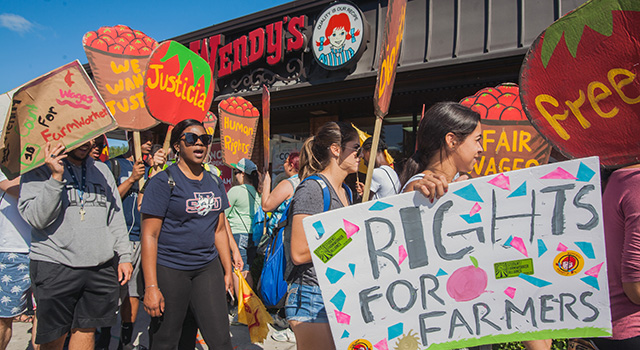By Marlene Quaroni - Florida Catholic
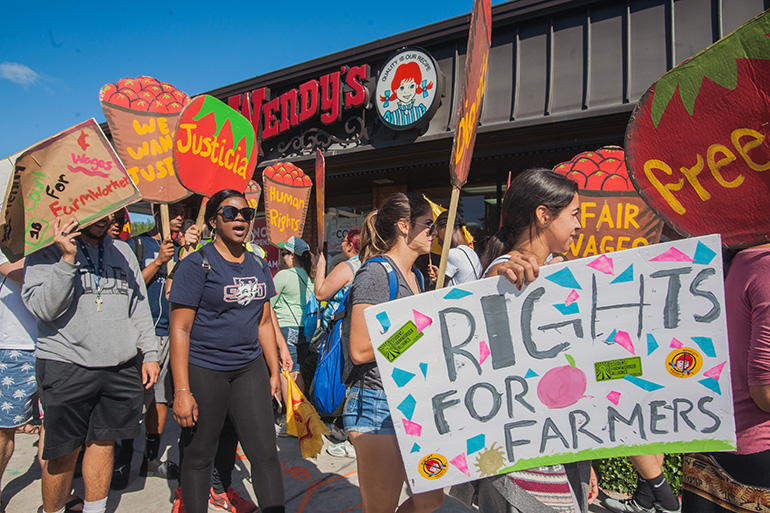
Photographer: MARLENE QUARONI | FC
St. Thomas University and Barry University students joined members and supporters of the Coalition of Immokalee Farmworkers at the fourth annual March for Fair Food in downtown Miami Nov. 11. They walked to a Wendy's and a Publix, corporations that do not participate in the Fair Food Program.
MIAMI | Paola Montenegro wants to make people aware of the plight of farmworkers. That’s why she marched, along with about 300 others, in the fourth annual Miami March for Fair Food.
“I’ve been to Immokalee,” said the Barry University political science major. “I’ve seen how hard it is for farmworkers. We’re inspiring and giving hope for the future. We are educating consumers to become more socially conscious. I want to continue advocating for human rights.”
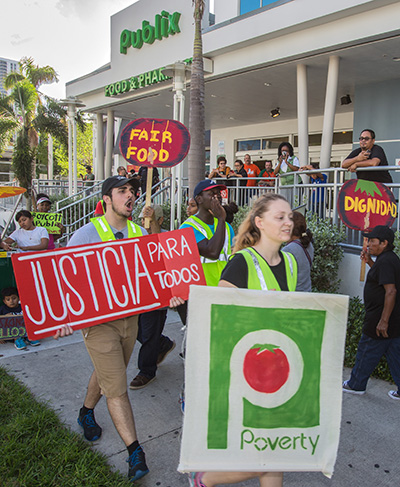
Photographer: MARLENE QUARONI | FC
St. Thomas University and Barry University students joined members and supporters of the Coalition of Immokalee Farmworkers at the fourth annual March for Fair Food in downtown Miami Nov. 11. They walked to a Wendy's and a Publix, corporations that do not participate in the Fair Food Program.
The marchers, who set off from Margaret Pace Park on Bayshore Drive Nov. 11, included over 120 students from St. Thomas and Barry universities as well as members of the Coalition of Immokalee Workers. CIW is an internationally recognized, worker-based human rights organization started in 1993 in the southwest Florida town. For the STU students who participated, it was a culmination of their studies on immigration, farm labor and agriculture in Florida.
STU philosophy professor Darrell Arnold had five of his classes studying issues of justice and ethics in Western philosophical traditions. He had his students apply this learning to the issues of farmworker exploitation and modern-day slavery in Central Florida. History professor Francis Sicius had his students studying the history of agriculture in Florida, including the shift in people’s view of the land — from one of relationship in the early years of Florida agriculture, to one of exploitation in later years of industrial agriculture.
Students from all of the classes also participated in day-long immersions to Immokalee, where they worked with direct service providers and met with the Coalition of Immokalee Workers.
“The U.S. Catholic Bishops Conference, as well as Archbishop [Thomas] Wenski himself, have a long history of supporting farmworker rights,” said Anthony Vinciguerra, coordinator for Community Engagement at St. Thomas University, who facilitated the learning experience. “This is a way we are able to engage students from a variety of disciplines in the Church’s teaching on farmworker rights, as well as expose them to ways they can make a real difference in the world. It means bringing theory to action — and it is a key part of what makes our university Catholic.”
The marchers carried large protest signs that read: Justice for Farmworkers, Dignity, Do the Right Thing, Farmworkers Earn Poverty Wages, and Wendy’s Old-Fashioned Exploitation. They chanted: “What do we want? Justice! Fair Wages! When do we want it? Now!”
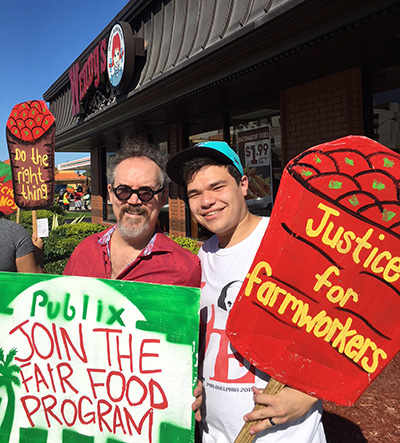
Photographer: COURTESY PHOTO
St. Thomas University philosophy professor Darrell Arnold, left, poses with theology student Alberto Rodriguez during the Nov. 11 Miami March for Fair Food.
They walked along Biscayne Boulevard to a Wendy’s and back to a Publix store. Once they reached Wendy’s and later, Publix, a delegate from the marchers gave a letter to the manager and asked that the company participate in the Fair Food Program. The program protects workers’ human rights all along the retailer’s supply chain.
“The Fair Food Program is a groundbreaking partnership among farmworkers, Florida tomato growers and 14 major food retailers, including McDonald’s, Burger King and Walmart,” explained Vinciguerra. “Participating retailers agree to purchase exclusively from suppliers who meet a worker-driven code of conduct which includes a zero-tolerance policy for slavery and sexual harassment.”
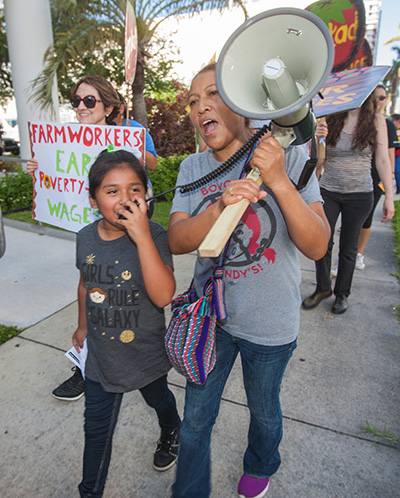
Photographer: MARLENE QUARONI | FC
Daisy Vasquez, 8, leads protest chants as Silvia Perez holds the megaphone during the March for Fair Food Nov. 11.
The March for Fair Food highlighted the CIW’s current “Harvest Without Violence” campaign, which aims to draw attention and put an end to sexual and other human rights violations.
Advocates say most female farmworkers have experienced sexual harassment. The female farmworkers refer to the Fair Food program’s strict human rights code of conduct, including a zero-tolerance for sexual violence, as a “new day,” said Vinciguerra.
Retailers participating in the Fair Food Program pay a penny per pound premium which is passed down through the supply chain and paid out directly to workers by their employers.
“Tomato pickers earn about 50 cents per each 32-pound bucket that they pick. The Fair Food Program brought the total to about 82 cents per bucket,” said Vinciguerra.
The internationally acclaimed program also allows workers time in the shade and water breaks as they labor from early morning to early evening in the hot Florida sun. Many Immokalee farmworkers live in substandard houses and trailers, Vinciguerra noted. “They don’t receive job benefits or overtime pay.”
Wendy’s and Publix so far have refused to join the CIW’s Fair Food Program. Wendy’s shifted its tomato purchases from Fair Food farms in Florida to Mexico, where workers face labor abuses without access to protections. The company has responded to concerns about abuse in their supply chain by saying they are quite happy with the quality and taste of the tomatoes they are sourcing from Mexico.
As the annual march concluded, Natalia Naranjo, of the Immokalee Alliance for Fair Food, told the marchers that the walk to justice is a long one. “It will take all of us together.”
In New York City, a mobile “Harvest Without Violence” exhibit took place at several locations from November 9 to 20, and included a march and plea to Wendy’s chairman of the board, asking the company to join the Fair Food Program.
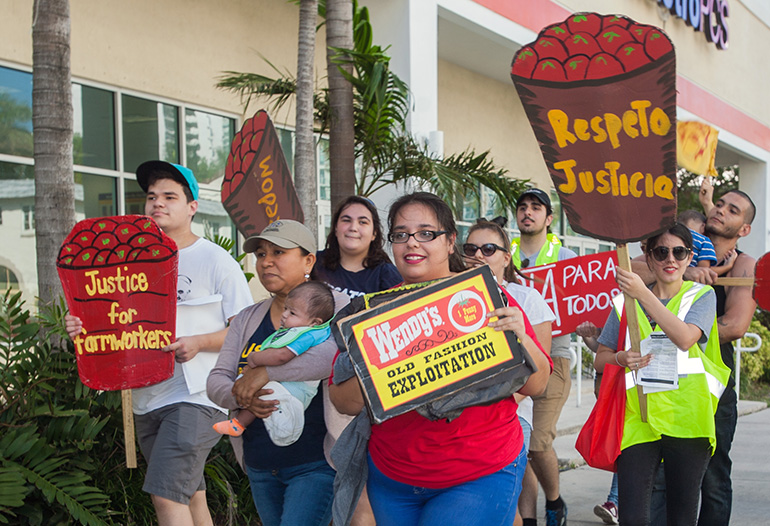
Photographer: MARLENE QUARONI | FC
St. Thomas University and Barry University students joined members and supporters of the Coalition of Immokalee Farmworkers at the fourth annual March for Fair Food in downtown Miami Nov. 11. They walked to a Wendy's and a Publix, corporations that do not participate in the Fair Food Program.
